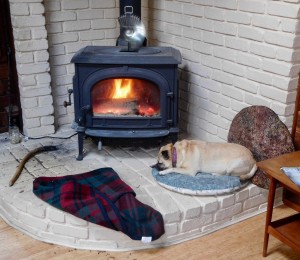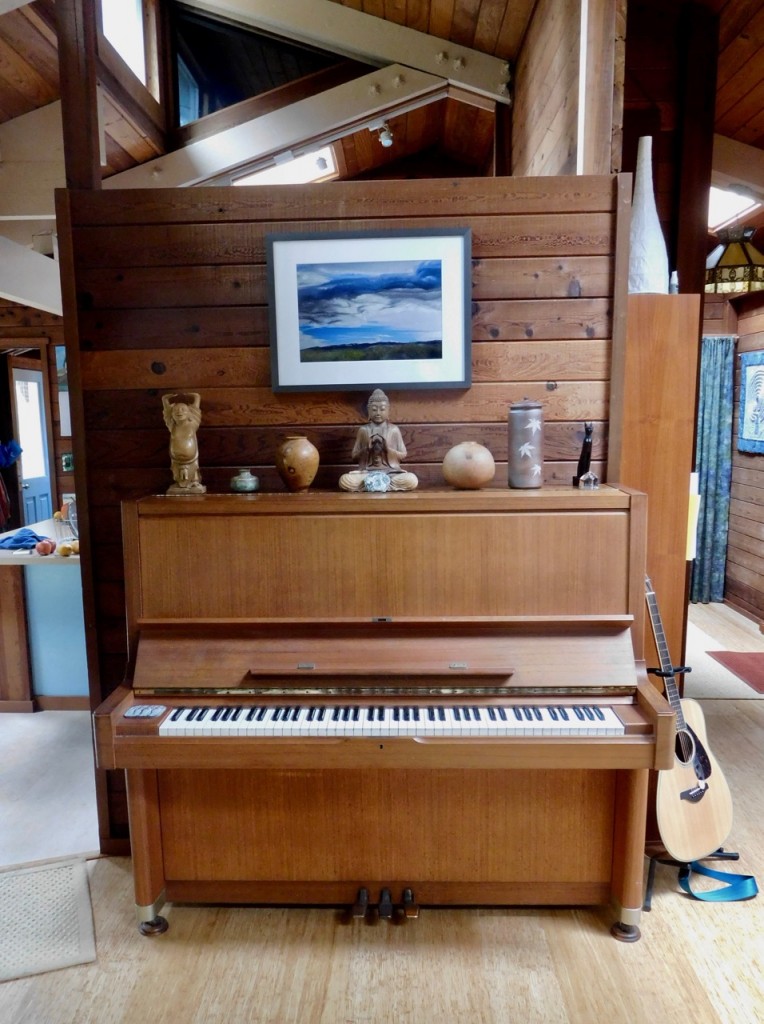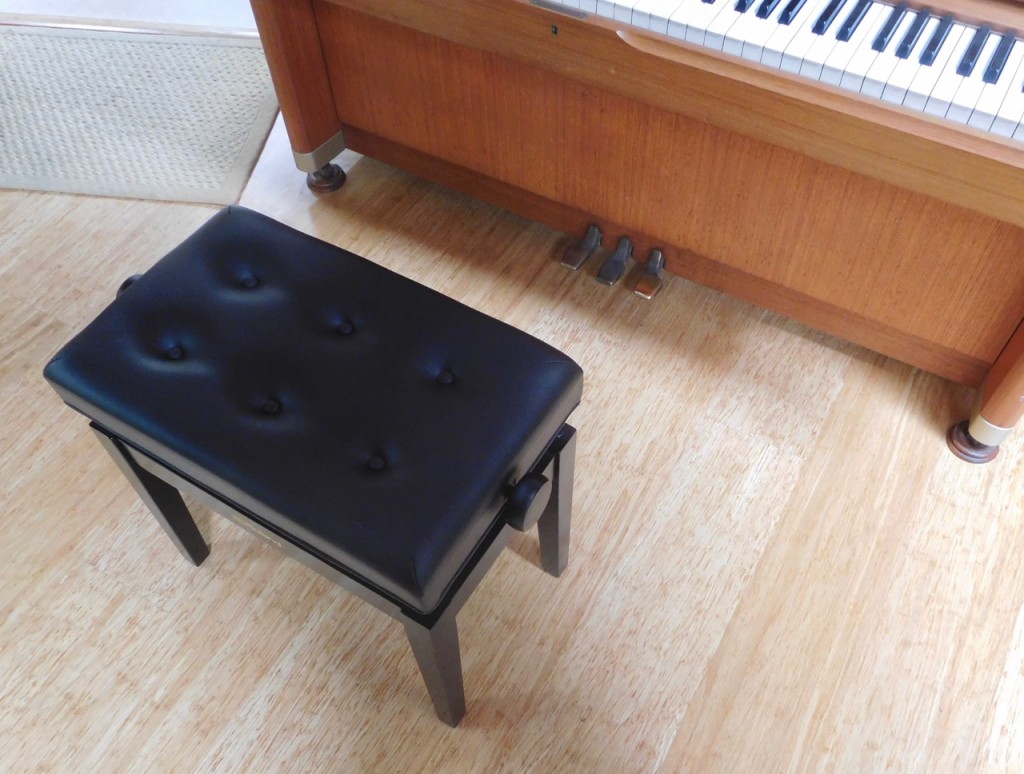
Okay, so I’ve been in love with Elisha Montoya for four years, three months, two weeks and five days. I know with such exactitude because in my desk calendar for that year, on the day she and her children arrived in our midst, I wrote in purple ink: Elisha Montoya appeared in Mona’s today. Spanish Irish? Reddish brown hair. Quietly regal. Simply beautiful. Two sweet kids, Conor and Alexandra. Love at first sight.
So, yes, I am a romantic, though I’d stopped thinking of myself as such until Elisha came to town and became the leading light at Mona’s, the one and only bakery/café in Carmeline Creek, our small town on the far north coast of California. Schmaltz alert: Elisha became my muse, poems and songs gushed forth, and now she and her children are the emotional epicenter of my life. I haunt Mona’s most mornings, give Conor and Alexandra guitar lessons, the four of us have supper together two or three and sometimes four nights a week, and in every way except the conjugal bed, we are a family.
The few times I attempted to shift my friendship with Elisha, who is forty-six, into a romantic entanglement, she rebuffed me, not unkindly, but firmly, and so I let such hopes go the way of Dodo; and if that reference means nothing to you, how about the word extinct?
My name is Paul Windsor. I am fifty-five, five-foot-eleven, graying brunette, musician, poet, and gardener. I share my small house with two large dogs, Zerc and Raj (Xerxes and Mirage), good-natured Golden Retriever Blue Heeler siblings who require, at minimum, two long walks every day else they drive me mad with their restlessness.
Following two disastrous marriages and three angst-ridden relationships, I have lived alone for nine years, though in the privacy of my thoughts I am married to Elisha, minus tender kisses and passionate embraces and sex, a minus that makes me sigh every time I see her. Oh well.
∆
So here I am on a sunny afternoon in May, in need of a haircut and about to leave for a three-mile jaunt across the headlands with Zerc and Raj, when Elisha shows up sans children and looking lovely in a long skirt and crimson shirt, a small red rose in her hair. She accompanies me and the dogs on our walk to the beach at the mouth of Carmeline Creek where I throw tennis balls for the water-loving mutts for twenty minutes before we return to my house with an hour of daylight left.
“What fun going on a walk with you,” I say, standing with Elisha in my rose-infested front yard, the dogs having run around to the back porch to drink from their water bowls. “Though you did seem mightily distracted and, dare I say, anxious about something, not that it’s any of my business except… did you want to tell me something?”
She forces a smile and makes an adorable spluttering sound. “Can we go inside?”
“Of course,” I say, smiling curiously at her.
We have tea at my kitchen table, the late afternoon sunlight making of Elisha a modern Ver Meer, and after a few minutes of idle chit chat, and with absolutely no forewarning, Elisha asks, “Would you be willing to pretend to be married to me?”
Now here’s a funny thing, not funny ha-ha, but funny strange. For a moment, maybe four seconds, I think Elisha asked me to marry her, and apparently four seconds is enough time for the neuro-hormonal consortium to flood my system with joy before my rational mind takes over and the joy is obliterated by bitter disappointment.
“Pretend to be married to you?” I say, feeling stabbed in the heart. “Why would I do such a thing?”
“Oh, Paul, I’m sorry.” She winces sympathetically. “I just… I don’t know what else to do except run away again, and I don’t want to run away again. We’re happy here, happy for the first time in our lives and…” She makes another spluttering sound very much like the earlier one, but I don’t find it adorable this time. “I should have explained first before I asked you, but I’m just so…”
“Fucked up,” I say, realizing this is the first time I’ve ever been angry with her. “I know the feeling.”
“You never use that word,” she says, frowning at me. “Not that I’m aware of.”
“You’ve never insulted me before,” I say, shrugging. “But there’s always a first time.”
She bows her head. “I’m so sorry. I never want to insult you. And I’m sorry I haven’t been…” She looks up at me, her blue green eyes full of tears. “I’m sorry I’ve been afraid to… and it isn’t because I don’t find you attractive, I do. It’s just…”
“Stop,” I say, holding up my hand to add emphasis to my request. “Just tell me why you asked if I would be willing to pretend to be married to you, and we’ll be done with it. I have long been resolved to the twin roles of brother and uncle vis-à-vis you and your marvelous children. Please say no more about attraction, but do enlighten me.”
She fights her tears, and I wonder if she seems ultra-beautiful to me because I’m in love with her or if I’m in love with her because she is so beautiful to me, not that it matters, but that’s what I’m wondering as I memorize the way she looks, her long reddish brown hair alluringly windblown, her cheeks ruddy with emotion, her eyes sparkling.
∆
“I lived with my mother in Dublin until I was twenty-six,” she says, getting up from the table and going to the window. “She was the manager of a restaurant and I worked there as a waitress. She was only seventeen years older than I, but we were not sisterly. She had survived my alcoholic father and rarely had more than a sip of wine or beer until she turned forty-three. But then she started drinking heavily and using cocaine and bringing strange men home to our little apartment, and life became intolerable there for me, so when I was offered a job as a waitress in Boston, I jumped at the chance.”
She comes back to the table, starts to sit down, changes her mind and returns to the window.
“I’ve always loved poetry and music, as you know,” she says, turning to look at me, “and on my nights off, I’d go to cafés to hear poetry and folk music and jazz, and I fell in with a gang of poets and musicians and their friends, and after three years in Boston, I moved with Kevin—I’ve told you a little about him—to a big farm on the outskirts of Montpelier in Vermont, a commune with three couples with kids and three couples without kids. And a month after we got there I was pregnant.”
She comes back to the table and sits down, but doesn’t speak for several minutes.
And I’m just about to ask what her getting pregnant sixteen years ago has to do with my being willing to pretend to be married to her when she says, “I don’t know how to explain except to tell you from the beginning. Is that okay?”
“Of course,” I say, my anger having morphed into a retroactive jealousy that I am not the father of Conor and Alexandra.
“Thank you,” she says, gratefully. “So… the saddest thing about my four years with Kevin was that I didn’t love him, and if I hadn’t gotten pregnant when I was too stoned to be careful, we wouldn’t have stayed together more than a few months. But once I was pregnant, I resigned myself to making a life with him. I’m what Flo calls a deep monogamist and… well, anyway…”
“Why did you move there with him?” I ask, ever curious about who we love or don’t love and why. “If you didn’t love him?”
“We went as friends,” she says, nodding to affirm this. “We both wanted to get out of the city and we were both intrigued by the idea of living in a commune, and when he was invited to join, he invited me to come with him. But I never imagined I’d have a child with him.” She laughs a little and shakes her head. “And then we had two, though he left me when I was four months pregnant with Alexandra.”
“What a cad,” I say, wishing I’d been there to help her. “So what did you do?”
“We stayed on the farm, my babies and I, until the wife of the man who owned the farm ran off with the husband of another of the couples, and then the man who owned the farm told everyone to leave and I went back to Boston with four-year-old Conor and one-year-old Alexandra and got a job as a waitress in a ritzy restaurant.”
“Was Kevin… did he help you in any way? Send you money or…”
“No,” she says, shaking her head. “We never saw him again. He and I never got married, so…”
“But how… was he good to Conor before he left?”
“He was okay.” She shrugs. “He wasn’t comfortable with children. He liked fixing things and building things, but he was helpful with Conor, and Conor adored him.”
“Didn’t you say he liked poetry?”
“He did. He loved going to poetry readings. Something about being read to in that way fed him.”
“Speaking of feeding,” I say, trying for a little levity, “we’re approaching suppertime. Do you need to contact the dynamic duo?”
“They’re having supper with Flo and Grady tonight,” she says, gazing at me. “You hungry? I could make us something.”
“Or I could make us something.”
“Or we could make something together.”
∆
We make spaghetti with a mushroom and zucchini and tomato sauce, I crack open a bottle of decent red wine, and as we cook…
“There you were,” I say, chopping tomatoes, “in Boston with two little kids, working in a ritzy restaurant, and…”
“After two years of doing nothing but working and taking care of my children, I met a man named Arthur Chance.” She drops the noodles into the boiling water. “And because I was starved for love, I made the mistake of sleeping with him.”
“Oh,” I say, feeling another upwelling of retroactive jealousy. “Why was it a mistake?”
“Because he took it to mean I loved him and wanted to be with him, neither of which was true.” She stirs the noodles. “And nothing I said would change his mind.”
“How many times did you sleep with him?” I ask, hoping she’ll say only once.
“Only once,” she says, nodding her thanks as I refill her glass. “One dreadful time. And then I told him I was very sorry but I didn’t want to see him again, and he said, ‘I don’t believe you.’ And for the next few months he called me every day, came to our apartment unannounced, came to the restaurant, and every time I asked him to leave me alone he said, ‘You need me, Elisha. You’re just afraid to love someone again because your husband abandoned you. But I will never abandon you, and eventually you will learn to trust me, and then we will be lovers again and husband and wife.’”
“Did you call the police?”
“I did,” she says, starting to make the salad. “They sent two officers to corroborate my story, and when they saw what Arthur was doing, they warned him that if he persisted they would arrest him. So he stopped coming to the apartment and the restaurant, and stopped calling me, but I saw him many times after that, never so I could claim he was following me, but I know he was. And eventually I stopped being able to sleep and my children were more and more upset by me being so disturbed, so we ran all the way across the country to a little town in Arizona, Caldwell, and lived there for three years until one day I got a phone call from Arthur at the bakery where I worked, and when he heard my voice, he said, ‘Ah, I’ve found you. It’s Arthur. How are you?’ And because he didn’t sound crazy, I said I was fine. Then he asked if I was married, and I said No, and he said, ‘I knew you were waiting for me. I’ll be out there in a few days.’ And I shouted, ‘Don’t you dare come here. Don’t you dare ruin my life again.’ And then I hung up.”
“Did he come out in a few days?”
“Yes. And when he came to the house, I told him I would call the sheriff if he didn’t leave, and he said, ‘But I just came to say hi. There’s no crime in that.’ Then he just sat in his car in front of our house, so I called the sheriff, and when the sheriff came, Arthur explained that he and I had been lovers in Boston and then split up, and when he decided to move to Caldwell, he discovered I lived there and came to say hi with no intention of bothering me if I didn’t want to associate with him. I remember distinctly his use of the word associate and how it made me want to kill him.”
“What did the sheriff do?”
“He asked me if Arthur’s story was true and I said it was a lie, but since I couldn’t prove that, and Arthur hadn’t done anything illegal, there was nothing the sheriff could do. And everywhere we went for the next few weeks, there was Arthur. So we ran away again. And after a year of camping and staying in motels in Idaho and Washington and Oregon, leaving no traces, we came here.”
“And now he’s found you again.”
“Yes,” she says, stirring the sauce, “only this time he didn’t call me. He sent me a letter care of the post office. He said he read an article on the internet about my inheriting Rex’s house and how the will was contested. He said he’s coming here to make sure I’m doing okay in the face of such hostility from the community.”
“And you are hoping that an apparent husband will finally convince this lunatic to leave you alone?” I ask, draining the noodles.
“Yes,” she says, carrying the salad to the table. “An apparent husband who does not take kindly to another man harassing his wife.”
“Do you think this lunatic might resort to violence? Should he find you with an apparent husband?”
“I doubt it,” she says, shaking her head. “But I don’t know.”
“Please forgive me for prying, but… have you had other lovers since you slept with Arthur?”
“No,” she whispers.
“Ah,” I say, nodding.
“Ah what?” she says, frowning at me.
“Your fear of him kept you from loving another.”
“Yes, it did,” she says, nodding.
∆
After supper we sit on the sofa in my living room enjoying the crackling fire, my dogs sprawled at our feet.
“I see a number of problems with your plan,” I say, loving this time alone with Elisha despite the gravity of the situation. “May I enumerate?”
“Please,” she says, sitting much closer to me than she ever has.
“First of all, should this fellow come to our town, he will encounter no one here who knows of our supposed marriage. Second, your children will have to be enlisted in this pretense of our being married, and brilliant as your children are, they are not trained actors. Third, we would have to concoct a believable living-together charade involving all of us sleeping under one roof, this roof or your roof, and…” I pause portentously. “…you and I ostensibly sleeping in the same bed.”
“Seems crazy,” she says, nodding in agreement. “So what do you think we should do?”
“We?” I say, arching an eyebrow.
“You and I?” she says, looking into my eyes.
And though my rational mind is shouting at me not to succumb to impulse, I say, “I don’t think we should pretend. I think we should be lovers and get married and live together for the rest of our lives.”
“Okay,” she says softly. “That’s what I want, too.”
I freeze in quasi-disbelief, deduce from the available data that she wants me to kiss her, so I do, and our kiss turns out to be one of those doozies that propels us to my bed where, as the old saying goes, we know each other and the knowing is good.
∆
We wake early the next morning with a renewed thirst for knowledge, and when our thirst is quenched for the nonce we make an omelet and look at each other as if seeing a miracle unfolding, which I guess one is.
Tummies full, Elisha calls Florence, strategizing ensues, and ere long we are a party of seven in Grady’s turquoise 1967 Lincoln Continental heading over the hill to the county seat to get married.
Grady, seventy-four, is driving, Florence, fifty-three, sits beside him, and next to Florence is Delia Krantz, ninety-four, honorary mother and grandmother to all of us, while in the backseat, Elisha and I bookend Conor, fifteen, and Alexandra, twelve—the mood jubilant.
I keep expecting to wake up and find myself alone in my bed as per usual, but Elisha keeps being there giving me alluring looks, and Conor and Alexandra keep being between us, both of them grinning.
Now we are getting out of the car and going into a big old brick building and standing in line to get our marriage license as prelude to gathering in a little room where a smiling woman with short gray hair reads a brief speech about marriage and Elisha and I vow to stick together through thick and thin unto death and Grady hands me a ring I slip onto Elisha’s finger and Florence hands Elisha a ring she slips onto my finger and we kiss and everyone cheers and cries.
∆
Two days later at ten in the morning, I am sitting in Mona’s finishing a letter to my friend Cole who lives in Connecticut, updating him on my marital status. Elisha is behind the counter filling a bag with muffins for Jennifer Smits who works at the one and only bank in Carmeline Creek and is purchasing the muffins to share with her co-workers.
The door bursts open and Conor and Alexandra rush in with several copies of the Carmeline Creek Crier fresh off the press. Alexandra runs to Elisha, Conor runs to me, and my bride and I simultaneously admire the big color picture of us on the front page. We are standing on the steps of the county building, holding hands, Elisha looking gorgeous, I not gorgeous, but very happy. The caption reads Congratulations Elisha and Paul.
And the very next minute, and I mean the minute right after the kids brought us the Criers, the bakery door opens and Arthur Chance walks in. I know he is Arthur Chance because Elisha showed me a picture of him, though he is much older than he was in the picture—a few inches shorter than I, burly, his thinning black hair turning gray, his brown eyes magnified by thick-lensed glasses in black frames. He is wearing brown slacks and a wrinkled gray shirt and a garish yellow tie decorated with black squiggles. He reminds me of a harried businessman arriving home after a long commute, looking forward to a refreshing drink and a hug from his wife. And despite what I know about him, I don’t dislike him, nor do I sense he is prone to physical violence.
I stand up to face him—Conor and Alexandra beside me.
Arthur approaches the counter and says to Elisha in a surprisingly boyish voice, “There you are.”
“Please go away,” says Elisha, fighting her urge to scream. “You’re not welcome here.”
“You need me, Elisha,” he says, plaintively. “You need to not be alone.”
“She’s not alone,” I say, approaching him—Conor and Alexandra following close behind. “She’s with us. I’m her husband and these are our children. I appreciate your concern for my wife, but you are not wanted here.”
He sneers at me. “Mind your own business. This is between me and her.”
“No,” I say, shaking my head. “My wife’s business is my business, and if you don’t leave immediately, we will call the sheriff who is a very good friend of ours and no friend of stalkers.”
“She doesn’t have a husband,” he says, snarling at me. “You think I’m an idiot? Just stay out of this if you don’t want to get hurt.”
“Hey,” says Conor, stepping in front of me. “Don’t threaten my father. And stop bothering my mother. We don’t want you here. Just go away.”
“You need to see a psychologist,” says Alexandra, speaking quietly to Arthur. “You shouldn’t be following us. You need to leave our family alone.”
“What?” says Arthur, squinting at Alexandra and Conor.
“You need to leave our family alone,” says Alexandra, raising her voice. “We don’t want you here.”
Arthur blinks a few times as if waking from a trance and his snarl gives way to a look of bewilderment. Now he looks at Elisha who has been joined behind the counter by Mona, looks at Conor and Alexandra again, looks at the dozen other people in the café, all of whom are watching him, their fear palpable; and lastly he looks at me and I can see he realizes his psychic grip on Elisha is gone and there is no niche for him here, no place to hide, no victim to torture.
Now he hurries out the door—Conor and Alexandra and I following him out and watching him grow small in the distance and getting in a car and driving away, the car growing smaller and smaller until it disappears.
∆
We’ve decided to sell the house Elisha inherited from Rex Abernathy and expand my house to better accommodate the four of us. Living in town, we won’t need to drive except to go on long trips, so we’ll only need one car instead of two. The kids can walk to school, Elisha can walk to work, and I can walk the dogs on the headlands mid-morning—four dogs now, a happy pack.
In bed this morning, Elisha and I were enjoying the sounds of the kids in the kitchen feeding the dogs and starting the water boiling for coffee and tea, when Elisha wrapped her arms around me and said, “You were so wise to suggest we not pretend.”
fin













